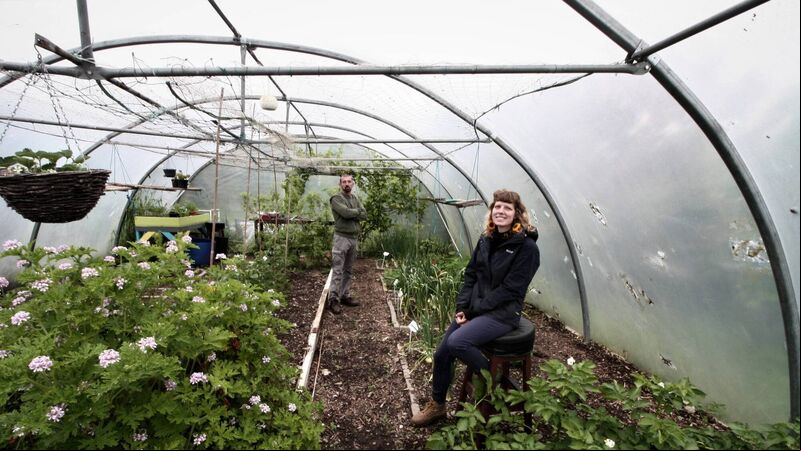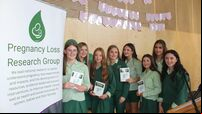Green Women: Finding her NICHE on Cork’s northside

Sarah Carr with her colleague JP O’Brien.
SUFFERING from stress or anxiety? There’s a mounting body of scientific evidence that suggests gardening can help.
While the green-fingered amongst us may have been touting the calming benefits of planting, weeding and sowing for generations, new research suggests that the soil itself also has a part to play in regulating our mood, as well as bringing physical health benefits.
A team of scientists at Colorado University in the U.S reported last year that a common soil bacteria can help combat anxiety and depression by interacting with immune cells: mice exposed to the mycobacterium were found to have an increased number of activated serotonin neurons in their brains, and serotonin is the brain’s happy hormone.
Sarah Carr, who works in Knocknaheeny’s NICHE community garden, is in full agreement: she says Horticulture Therapy has remarkable benefits that are only beginning to be fully explored.
“It’s kind of a new area, especially in Ireland, but it’s really interesting,” she says.
“We’re doing green care and horticulture therapy in NICHE anyway; we’re just not documenting it. People are coming into the garden and reaping the benefits from having access to outdoor space. It works for children, for people with dementia, for adults with mental health issues.”
With a background in nursing, Sarah is now a Community Health Officer at the HSE-funded NICHE community garden, and is currently completing an online course in Horticulture Therapy.
Brought up in Nottingham, Sarah fell in love with Cork when she came on a three-month Erasmus programme to UCC as a student. After qualifying as a disability nurse in the UK, she worked in mental health for a few years before deciding that a change of career was on the cards.
“I felt where I was working was very much based on a medical model and I wanted a more holistic approach,” she says.
“I decided to take a complete career break and I didn’t know what to do, so I signed up on a horticulture course, mainly for my own well-being.”
Sarah completed a FETAC Level 5 on Kinsale College of Further Education’s permaculture course.
“It inspired this idea of horticulture therapy and wellness from being in nature. I’m very much someone who needs to be in nature and going hiking and things like that. We all have an innate need to be in nature and connect with living things.”
Sarah found her love of nature blossomed following her move to Cork; having grown up in a built-up area of the UK’s Midlands, she re playing on housing estates as a youngster.
“I was amazed when I moved to Cork that you’re never more than half an hour away from the sea, or mountains or forests,” she says.
“If I couldn’t get out of the city at the weekend, I started to realise my mood was really suffering during my working week.”
The NICHE community garden, tucked away on a patch of land rented from Cork City Council, is a remarkable oasis on the Northside dedicated to organic food production: fruit trees and bushes, two polytunnels and beds ing a wider variety of vegetable crops, and a community kitchen where produce can be turned into cheap and nutritious lunches.
The project is ed by the local Men’s Shed, also based on the site, who make a variety of planters and composters for the garden.
“Nothing is waste here: any old junk is made into something, which is great,” Sarah says.
“The men built me a composting area and the community bring a lot of their compost from home: things like food scraps and grass cuttings get left at the gate and that’s very valuable for us. It all goes into the compost and gets used.”
Volunteers can take home a share of the crops they help to grow: most popular are potatoes and strawberries, Sarah says, but the garden grows a wide variety of fruits and vegetables, everything from broad beans to Brussels sprouts for Christmas dinner, as well as flowers like tulips and daffodils.
The garden is also home to a wildflower meadow, designed to pollinators like bees and butterflies, who not only add to the city garden’s biodiversity but also do important work in pollinating food crops.
“It’s all perennial, native wildflower seed, with things like crimson clover, borage and corn cockle,” Sarah says of the meadow.
“We ran a workshop to demonstrate how you can take a section of your garden and leave it to the bees. Attracting the pollinators is actually great for your crops too. We’ll only cut it once in the autumn.”
While horticulture might be therapeutic, it can also be challenging: after the Covid-19 lockdown, which restricted numbers accessing the garden during its most important planting and growing season, Storm Ellen posed another unwelcome threat to the garden. Sarah says the garden’s two polytunnels thankfully weathered the storm, but some crops were lost.
“Our sweetcorn and globe artichokes were damaged and now we’re worried about the potatoes in the ground because there’s been a blight warning as the weather has been so wet and humid,” she says.
“But you have to take the rough with the smooth and it’s all learning. Mostly, the people coming into the garden are learning how to grow food at home. Sometimes things don’t work: you can’t do anything about the weather.
“The tomato plants are doing fine in the tunnels and we always seem to be able to grow courgettes,” she says with a laugh, joking that they are amongst the least favourite ingredients with volunteers and visitors.
“We’ve made so much courgette soup and even tried courgette cake!”
During the Covid lockdown, Sarah and her colleague John Paul O’Brien shouldered the bulk of the work in maintaining the garden themselves, but also distributed seeds so that regular visitors bitten by the gardening bug could continue to plant and grow at home.
They even resorted to doing doorstep deliveries to volunteers to ensure the vegetables didn’t go to waste, and posted ‘how to’ videos on the garden’s Facebook page.
“We tried to bring the community garden to them by dropping people seeds and seedlings, but it’s not the same as having people around,” Sarah says.
“We have groups coming in for an hour now, but there’s not a lot you can do with a group in an hour so myself and John Paul are trying our best to keep on top of it. But even the weeding alone is a lot, so we’re looking for regular volunteers. We’re looking for anyone who’d like to come and cut the grass and weed for us.”
On a busy day, Sarah estimates that the NICHE garden will have about 20 regulars drop by, as well as people coming in out of curiosity or to enjoy a cheap meal. She has ambitions to grow this number and to use the space for a bigger variety of activities.
“I’m hoping to bring more people into the garden,” she says.
“Even in the area, a lot of people don’t even really know about it and we’re quite well-hidden so not enough people know where we are. People have skills you wouldn’t even imagine are out there.”
Sarah would also like to be able to staff the garden enough to open full-time hours instead of the current three-day week.
“I’d like to run more courses on well-being and gardening and food-growing. And I’d love to get more organisations in to use the space,” she says.
“I feel like it’s totally under-utilised at the moment. It’s a massive space and I’d love to see people come in and take more ownership of it. It’s not used at the weekend at all, for example, so running a little market there would be amazing.
“It’s so rewarding to see something as a tiny seed and suddenly it’s a huge cabbage. I get huge satisfaction out of that and so do the volunteers.
“The pride that people take is enormous, especially when it comes to cooking. Everyone who’s sat at the table needs to know that it was grown here. It’s good to grow a variety and introduce people to new tastes.”
For Sarah, her journey into organic horticulture has been accompanied by an environmental awakening, in everything from climate change to the use of pesticides and plastics.
“I think I went through a depressing stage, where I’d go to Lidl to do my shopping and I knew I wanted to buy organic because I’d read so much about pesticide use, and there’d be organic carrots in plastic packaging and non-organic carrots loose,” she says.
“I leaving with nothing and then going, that’s ridiculous. You have to bring it back to what you can do yourself, and starting conversations, instead of it all being pessimistic.”
Sarah says that the perception that environmental concerns including climate change, single-use plastics and organic food production are a middle-class concern are a misunderstanding of the challenges faced in communities that traditionally suffer from deprivation, including the Knocknaheeny area.
“I think there can be other issues going on in people’s home lives that means that conversations about environment aren’t taking priority, but it doesn’t mean people don’t have those concerns because they really do,” she says.
“If there are mental health, addiction or food poverty issues in a home, those things absolutely take charge of your day-to-day life. You are less likely to be thinking first and foremost about plastic pollution if you are just trying to put food on the table. You have to be very mindful because you definitely don’t want to be making people feel guilty for the way they’re living their life because they may not have much choice.”







 App?
App?


